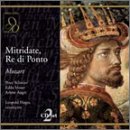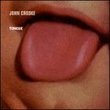| All Artists: Mozart, Schreier, Moser, Auger, Watts, Hager Title: Mitridate Re Di Ponto Members Wishing: 0 Total Copies: 0 Label: Opera D'oro Original Release Date: 1/1/1971 Re-Release Date: 8/6/2002 Album Type: Live Genre: Classical Style: Opera & Classical Vocal Number of Discs: 2 SwapaCD Credits: 2 UPC: 723724443723 |
Search - Mozart, Schreier, Moser :: Mitridate Re Di Ponto
CD DetailsSimilar CDs
|
CD ReviewsA Collector's Piece: Mozart's First Dramatic Opera 01/27/2005 (5 out of 5 stars) "The previous review provided a fair critique of this glorious album but didn't get into depth. This is indeed a collector's piece and the most beautiful recording of the rarely staged opera. There are other recordings out there, including a splendid and recent recording starring lyric coloratura soprano Natalie Dessay and mezzo-soprano/dramatic soprano Cecilia Bartoli. Among others we find an English version. But this recording, of a live performance in Salzburg in August 25, 1971, conducted by Leopold Hager, is one of the very first recordings that were made commercially available and it's magnificent. It's an opera jewel and the opera sounds fresh, powerful and gorgeous. It has been digitally remastered. Not bad for a live performance. We only get applause at the end of all the big scenes and arias. There are no distracting and annoying coughs or other "live" sounds coming from the audience. The sound and acoustics is excellent. The cast includes lyric tenor Peter Schreir in the demanding role of King Mitridate, soprano Edda Moser in the equally demanding role of Queen Aspasia, soprano Pilar Lorengar as Ismene, and mezzo sopranos Arlene Auger and Helen Watts in the male roles of Sifare and Farnace. Auger and Watts, both women in the role of men, use their lower "chest" voice gloriously, heroically and maintain a lyric beauty that is unsurpassed. There is even an ensemble finale in which the voices of all the women in the cast sing like glorious goddesses. The dynamics of these amazing singers working together in a dramatic opera is what makes this a really top-notch performance. Each singer is virtuosic in their roles. Peter Schreier as Mitridate is incredible. A lot of the arias written for the part were designed for a castrati who were still employed in the opera at the time of Mozart's early career in opera. Thus, the arias are fiendishly difficult and high, with tremendous power and bravura. It's a vocal trapeze act with coloratura and lyric passages. The king must also come off as noble and heroic. Schreier delivers all these traits in his excellent performance. For me, listening to his aria "Se di Lauri il Crine" his bombastic opening aria as he returns home from war victorious is enough to get me to buy other albums of his. He was essentially a lyric German tenor in the tradition of Fritz Wunderlich in the post World War II period (50's 60's) but he sang into the 70's. Edda Moser as his wife Aspasia is perfect pairing. Her high tessitura, dramatic voice and Wagnerian/Birgit Nilsson "class" voice is effective for portraying a majestic, passionate queen. She has many fine moments- virtuosic arias include "Al Destin Chi La Minaccia" her first, the fiery and furious "L'odio Nel Cor Frenate" "Re Crudel..Vado Incontro" and the hauntingly beautiful "Pallido Ombre". In this dramatic scene, the Queen, who is torn between her love for the King and for Sifare is in the verge of suicide. A more perfect album of Mitridate you are hard pressed to find. This is the one to get. If you enjoyed this, you will also enjoy "Idomeneo" starring the same cast of singers- Moser, Schreier and Auger." A Phenomenonal Opera Rudy Avila | Lennox, Ca United States | 09/30/2004 (5 out of 5 stars) "Mozart wrote Mitridate when he was 14 and already displayed talent for opera. The opera seria was in vogue in 1770, at the time of this opera, and Mitridate was Mozart's final series of Italian operas written on his tour of Italy. It takes place in 63 BC in Asia Minor. Mitridate is king of Ponto. His fiance Aspasia, is also loved by his sons Farnace and Sifare. When Mitridate goes off to war, a rumor circulates that he has died. A battle over the throne ensues between the two brothers but things are further complicated when Mitridate returns alive. The opera is full of political and family struggles. In the end, Mitridate is reconciled with his sons. This historic, "Trojan times" type of opera was very popular and had been since the days of the Baroque operas. This recording is one of the first to be revived. This being one of Mozart's early operas following his first "La Finta Simplice". Another studio recording exists, with greater sound maybe and with the more famous singer Cecilia Bartoli in the cast but for the most part Mitridate remains a rare opera that is hardly performed or recorded today. This is the best version in my opinion, even greater than the studio recording with Bartoli because of the enormous talent of the dramatic soprano Edda Moser. Edda Moser has the perfect tessitura, high notes and heavy, dramatic, Wagnerian voice that makes an opera even more engaging. She is singing the role of Aspasia, a woman who is a queen in her own right and who is torn between love for Mitridate and Sifare, his son. While the role of Aspasia calls for a dramatic diva, it has moments of lyrical splendor that Edda Moser delivers note for note. She was a champion of rare operas, and her voice was versatile so that she was able to sing Mozart (Dona Anna in Don Giovanni, The Queen of the Night in Magic Flute, Puccini (Liu in Turandot) and Wagner (Wellgunde in Das Rheingold) Rossini's Stabat Mater and German operettas such as Suppe's Boccacio among others. Edda Moser in this recording is sensational. You have to hear her!! One dazzling aria after another in a dynamic performance. I highly recommend this recording for fans of Edda Moser and those who seek out rare operas on record." Proper casting of singers makes a world of difference. Abel | Hong Kong | 03/19/2007 (5 out of 5 stars) "The first two reviewers of this historical set really summed up my view point.
Just one point more to mention - comparing with Decca's later stellar cast, Leopold Hager's cast really fitted Mozart's score as a fiddle. Sifare, the primo uomo or first castrato role, is a soprano role. Arlene Auger sang this role here to such technical height that Ms. Bartoli, a mezzo-soprano, could never be capable of handling. In fact, listening to Auger in this recording really provided the answer to my query of Cecilia Bartoli's recent 'problem' in choice of repertoire - Ms. Bartoli has ventured into a fach that is too high for her range already. As a result, her coloratura becomes painfully shrill and unpleasant to the ear, losing the beauties of tone required and as demonstrated by true soprano coloraturas like Ms. Auger here. Then there is Moser's Aspasia as contrasted with Dessay's. Dessay is very agile, and very fresh of tone in Decca's 1998 recording. Having said that, her Aspasia is too thin-voiced to convey the drama and emotional turmoil required of this role. Thirdly, the Farnace, the secondo uomo or second castrato, is a mezzo-soprano role. Unlike Brian Asawa, Helen Watts in this live performance delivered Farnace's treacherously contradictory character to great dramatic effect. Other great performers in this live recording are Pilar Lorengar as the Princess Ismene and Peter Schreier in the title role. Both deliver very good performances alongside the other shiny protagonists. Mitridate and Sifare each lost one solo aria in this performance, and the recitatives are drastically cut, but without damage to the overall opera." |


